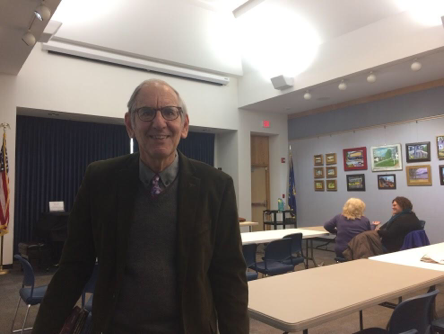By Isabella Barrantes
Professor Jeffrey Berman is a professor at the University at Albany, and the author of many books concerning hard-to-touch subjects such as death, self-disclosure, love and loss, and death education. He deals with subjects in the classroom—that other teachers shy away from due to their sensitive nature—in a way that students are able to write down and collaborate with their peers a shared sense of ‘self-disclosure’, and gain a better understanding of empathy in theory and in practice. During his introduction, the speaker mentioned that The Princeton Review included him in The Best 300 Professors, I had never known such a list existed but was not in the least surprised that Professor Berman made his way on it.
I signed up for Expository Writing with Professor Berman this semester (Spring 2020) to fulfill one of my Majors required credits—however, I was not quite sure what “Expository Writing” meant. The classwork is different than any class I’ve attended before. The insight I gained after attending the event “Teaching and Writing About Grief” helped me to understand more about the purpose of the class, and why it is set up in the way that it is. Professor Berman spoke on some of the books he has written, including Surviving Literary Suicide, which looks at the works of four writers who had committed suicide, and two more that almost succeeded. He mentioned that many of his titles are dark in nature but—as he mentioned in his introduction to my class—he doesn’t like to beat around the bush.
He encourages students to say more using less words, and to not use “filler” words like “very” or “pretty.” Due to the sensitive nature of his students’ writing Berman has maintained that essays are never graded based on content, or the degree of self-disclosure, but purely on the quality of writing in regard to grammar and sentence structure. Class discussions are never on content, but grammatical mistakes and how less words could have achieved the same or a more powerful end result. His classroom is organized with the desks in a circle, so that students can see each other. Students read their essays aloud, their classmates get to pick their favorite sentences, and then the three people sitting directly to the right of the speaker are given the opportunity to ask questions about the content of the text; however, the speaker is not allowed to answer! Although if so inspired they may write a follow up answer in their weekly journals, which is sometimes read aloud by Professor Berman with the students permission.
In addition to talking about his teaching practices, Professor Berman also read essays from his past students. The topic of one of the essays was suicide and the effect it had on the student who had written the essay; this essay was deeper and more personal than anything I’ve heard in the class thus far. In the essay the author had mentioned not wanting to burden their loved ones with their thoughts or feelings.
During the event, I caught my attention wandering, I was the only student (that I could tell) who had attended. I knew someone there who had a child preparing to go to college, and wondered what they must have thought upon hearing that more than half of college students have had suicidal thoughts, and that 10% end up with a plan. Professor Berman had the stats written down; numbers I forgot and had to look up again. What I didn’t forget though, was how more than one of the attendees looked visibly upset and shocked upon hearing them. I’d heard these numbers before but what I found surprising and extremely useful was to understand the full extent of the importance of teaching students how to cope with grief and the difference it had made for the student who had written about the heart-wrenching essay about suicide.
In his latest book, Risky Writing: Self-Disclosure and Self-Transformation in the Classroom, there are accounts from students who talk about traumatic events that they have never told anybody before—these students gave Professor Berman (who changes names to protect anonymity) permission to include their stories in the hopes that it will help give others the courage to tell their stories as well.





